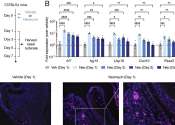How B cells recognize new variants of SARS-CoV-2
B cells are part of the immune system's memory. Their memories of previous infections or vaccinations provide the template for antibodies that have a protective effect the next time they come into contact with a pathogen.
1 hour ago
0
0



